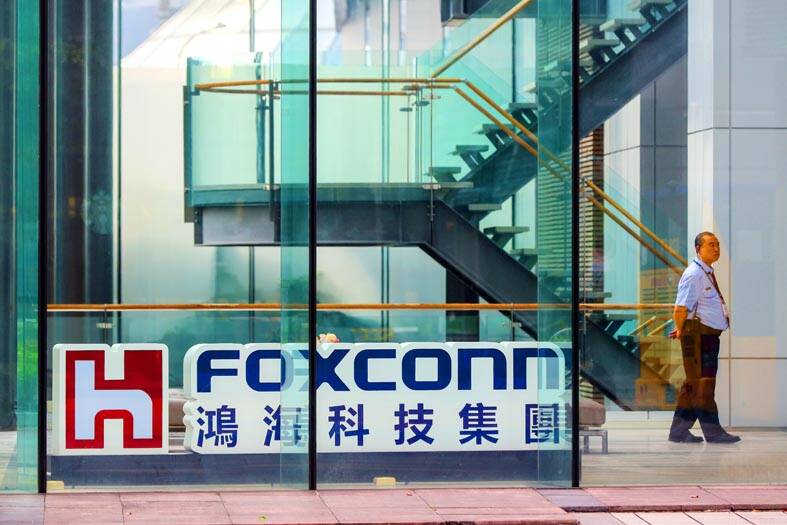Hon Hai Precision Industry Co (鴻海精密) yesterday said that revenue would grow significantly this quarter, thanks to seasonal demand for smartphones and robust growth momentum of artificial intelligence (AI) servers.
The company also expects revenue this year to be higher than NT$6.16 trillion (US$190.69 billion) last year, attributing the growth to robust demand for AI servers and electronic components, while smartphone revenue would be flat this year from last year.
Hon Hai’s remarks came as the major iPhone assembler posted the best second-quarter revenue and net profit in the company’s history, with revenue rising 19 percent year-on-year to NT$1.55 trillion and net profit growing 6 percent to NT$35.05 billion.

Photo: Ritchie B. Tongo, EPA-EFE
AI server revenue surged about three-fold annually due to demand for servers powered by Nvidia Corp’s H100 graphics processing units, the company said.
“Because of stronger AI server performance during the second quarter, the company’s revenue beat its expectations,” Hon Hai spokesman James Wu (巫俊毅) told a virtual investors’ conference.
“With the high season approaching, we expect the company’s operations to improve gradually this quarter,” Wu said. “We are expecting significant growth in the third quarter, both quarterly and annually.”
For the full year, Hon Hai is seeing better order visibility than what it saw in May, he said.
Nvidia reportedly plans to postpone delivery of its GB200 chips from the fourth quarter of this year to the first quarter of next year due to design flaws.
However, Hon Hai would stick to its original schedule and ship the first AI server racks powered by Nvidia’s GB200 chips next quarter, Wu said.
“We will definitely be the first company shipping such servers. Based on current visibility, we will start small volume shipments of GB200-enabled racks in the fourth quarter. We will ramp up shipments in the first quarter next year,” he said.
Hon Hai yesterday retained its goal of boosting AI server revenue contribution this year to more than 40 percent of its overall server revenue, due to customers’ interest in next-generation AI server racks and higher order visibility of AI servers equipped with H100 chips, Wu said.
The company’s earnings per share last quarter were NT$2.53, up from NT$1.59 a quarter earlier and NT$2.38 a year earlier.
Gross margin last quarter improved to 6.42 percent from 6.32 percent in the first quarter and 6.41 percent a year earlier, due to a better product portfolio, Hon Hai said.

Semiconductor business between Taiwan and the US is a “win-win” model for both sides given the high level of complementarity, the government said yesterday responding to tariff threats from US President Donald Trump. Home to the world’s largest contract chipmaker, Taiwan Semiconductor Manufacturing Co (TSMC, 台積電), Taiwan is a key link in the global technology supply chain for companies such as Apple Inc and Nvidia Corp. Trump said on Monday he plans to impose tariffs on imported chips, pharmaceuticals and steel in an effort to get the producers to make them in the US. “Taiwan and the US semiconductor and other technology industries

SMALL AND EFFICIENT: The Chinese AI app’s initial success has spurred worries in the US that its tech giants’ massive AI spending needs re-evaluation, a market strategist said Chinese artificial intelligence (AI) start-up DeepSeek’s (深度求索) eponymous AI assistant rocketed to the top of Apple Inc’s iPhone download charts, stirring doubts in Silicon Valley about the strength of the US’ technological dominance. The app’s underlying AI model is widely seen as competitive with OpenAI and Meta Platforms Inc’s latest. Its claim that it cost much less to train and develop triggered share moves across Asia’s supply chain. Chinese tech firms linked to DeepSeek, such as Iflytek Co (科大訊飛), surged yesterday, while chipmaking tool makers like Advantest Corp slumped on the potential threat to demand for Nvidia Corp’s AI accelerators. US stock

The US Federal Reserve is expected to announce a pause in rate cuts on Wednesday, as policymakers look to continue tackling inflation under close and vocal scrutiny from US President Donald Trump. The Fed cut its key lending rate by a full percentage point in the final four months of last year and indicated it would move more cautiously going forward amid an uptick in inflation away from its long-term target of 2 percent. “I think they will do nothing, and I think they should do nothing,” Federal Reserve Bank of St Louis former president Jim Bullard said. “I think the

Cryptocurrencies gave a lukewarm reception to US President Donald Trump’s first policy moves on digital assets, notching small gains after he commissioned a report on regulation and a crypto reserve. Bitcoin has been broadly steady since Trump took office on Monday and was trading at about US$105,000 yesterday as some of the euphoria around a hoped-for revolution in cryptocurrency regulation ebbed. Smaller cryptocurrency ether has likewise had a fairly steady week, although was up 5 percent in the Asia day to US$3,420. Bitcoin had been one of the most spectacular “Trump trades” in financial markets, gaining 50 percent to break above US$100,000 and